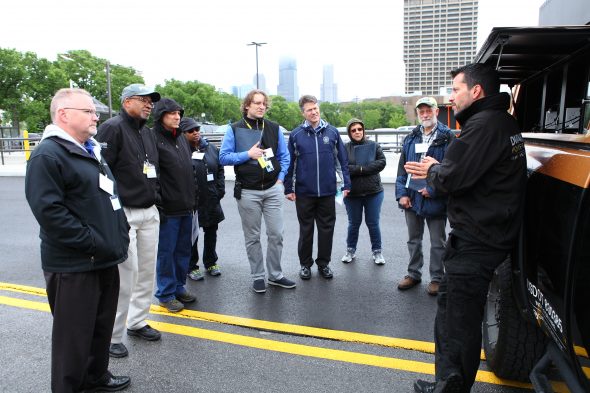UIC highlights emergency plans

In May, UIC hosted Operation Power Play, a statewide emergency preparedness drill. (Photo: Jenny Fontaine)
UIC will showcase its emergency preparedness plans Wednesday at the Preparedness Fair, hosted by Cook County’s Department of Homeland Security and Emergency Management.
The event, from 10 a.m. to 2 p.m. in Daley Plaza, provides information on how people can stay safe in an emergency as part of National Preparedness Month.
UIC is the only university represented at the fair. Staff will present information on campuswide emergency preparedness plans alongside government agencies, nonprofits and private sector organizations.
“We need to work in synergy with our local response agencies,” said David Ibrahim, assistant vice chancellor for administrative services. “We want UIC to ultimately serve as the focal point for higher education emergency planning not only regionally, but nationally in scope.”
Staff will highlight UIC Ready — an initiative facilitated by the Office of the Vice Chancellor for Administrative Services and the Office of Preparedness and Response — that ensures that UIC is ready to respond to emergencies, and provides guidelines that advise students and employees how to respond to emergencies such as an active shooter, bomb threat, fire and more.
At the fair, staff will also highlight other campus response initiatives, such as the EMS program, which is available to provide emergency medical care to students, employees or campus visitors.
“We want to raise our campus awareness so students, faculty and staff are more involved in preparing themselves and their community for a catastrophic event, and increase our level of overall university resilience,” Ibrahim said.
Wednesday’s fair is part of a larger collaboration with regional and statewide emergency response teams. In May, UIC hosted Operation Power Play, a statewide emergency preparedness drill. The exercise simulated a large storm damage scenario, where response teams would be pre-positioned to restore critical services.
It’s critical for university campuses and government emergency response teams to build relationships and have collaborative partnerships in place before a major disaster, Ibrahim said. The devastation in the aftermath of Hurricanes Harvey and Irma, for example, also impacted college campuses in the region, he said.
“We need to work together with our local response entities and be exchanging business cards before an event and not during an event,” he said. “Given our previous relationships that have been established with our county and city partners, we’ve brought more opportunities and attention to higher education by being advocates of planning on college and university campuses.”
